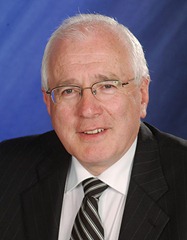Allan Ewart: developing cities in the recession
 Alderman Allan Ewart, Chairman of Lisburn City Centre Management, outlines how his city is facing up to the current recession’s economic challenges.
Alderman Allan Ewart, Chairman of Lisburn City Centre Management, outlines how his city is facing up to the current recession’s economic challenges.
Lisburn is facing the same challenges as many other town and city centres in the UK. With some essential key elements in place and a strong passion for the city, I believe that we can ride the storm and come out the other end a successful and vibrant city, with a successful city centre at its heart.
Lisburn is faced with the challenge of revitalising the city centre in the wake of a worldwide recession and slowing economy which is forcing shoppers to tighten their purse-strings and has forced many high street shops to close across the UK. The rise of online retail and declining economic activity all bring with them their own challenges for city centres.
In Lisburn, the on-going indecision over the Sprucefield development creates uncertainty in the city centre. This is not helped by the downward spiral of negative PR, which can make a difficult situation worse and may become a self-fulfilling prophecy.
A strong council with a passion for Lisburn is important. Lisburn City Council has always had a strong focus on the city centre, as evidenced by its commitment to creating inward investment opportunities through Invest Lisburn and a revitalisation of Lisburn’s Historic Quarter through the implementation of a development strategy.
The city council has not restricted its regeneration ambitions just to the city centre area but has also put in place, alongside other statutory partners, a major long-term programme for the Lagan Corridor to develop a thriving riverside area that will attract visitors and meet the expectations of local residents.
The Masterplan for Lisburn was competed in 2011 and one of the key projects to emerge from this is about to have a big impact on shaping the city for the future. The public realm scheme represents a £4.3 million investment in our city centre, funded jointly by the Department for Social Development and Lisburn Council. As has been evidenced in other areas, it is hoped that the works will be a catalyst to improve footfall, encourage investment and improve the city’s image to visitors and the local community.
Lisburn City Council demonstrates a commitment to the development of the city centre through the provision of core funding to Lisburn City Centre Management (LCCM).
LCCM works imaginatively to continually attract shoppers and visitors into the city centre through the organising of festival attractions, street animation, campaigning for free car parking, making the city a welcoming environment (through the managing of a ranger service to tackle litter and graffiti), and adding improvements to the city’s streetscape by managing the Bridge Street Townscape Heritage Initiative and championing the public realm scheme.
The council’s strong leadership of city centre regeneration in recent years has had a huge cumulative impact that has resulted in the restoration of 21 commercial units, the creation of 20 private apartments, a £26 million redevelopment of the South Eastern Regional College and the £4.2 million restoration to Castle Gardens within Lisburn’s Historic Quarter. Such regeneration came to fruition because of strong partnerships developed by the council with the Department of Environment’s Planning Service, Northern Ireland Housing Executive, Heritage Lottery Fund, LCCM and the local community.
The development of key shopping areas and a night-time economy will be fundamental to the regeneration of the city centre. People will expect that the city centre is not just a place to shop, but to socialise, with cafés and restaurants and living within the city centre as an option.
Lisburn needs to be able to adapt to such change in consumer expectations and ensure that it is uniquely placed to offer a lively and dynamic environment.
The growth of online retail can be seen as a challenge or as an opportunity. We must support our city centre retailers to engage with their customers online while continuing to offer the added value which can only be provided by their continued high street presence.
A vibrant city centre is important to establishing a positive image of the city as a whole and I believe that with our strong will to succeed and with essential investment, this will create the vibrant, positive, forward-looking city we all aspire to have.





